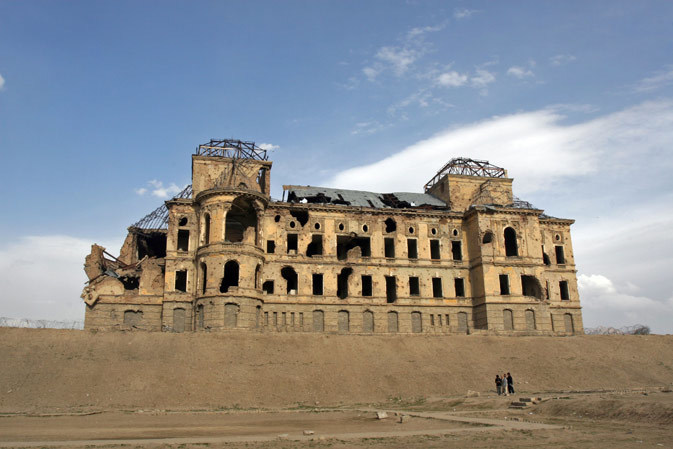KABUL: Inside an imposing building in Kabul, a team of welders hastily fuse a sweeping metal banister to a grand staircase. Outside, gardeners spray torrents of water over the parched earth, willing the grass to grow.
They have just days to finish a renovation of the once-ruined Darulaman Palace, a hulking showpiece of Afghan architecture that came to symbolise the country’s turmoil during decades of war.
With questions looming over Afghanistan’s future and a possible deal between the US and the Taliban imminent, the war-torn nation is this month hoping to briefly celebrate its past — and Darulaman will be the centrepiece.
Work at the famed palace must be completed by Aug 19, the date marking 100 years of Afghan independence from Britain, when President Ashraf Ghani will inaugurate the newly renovated structure.
The final use for Darulaman — which means “Abode of Peace” — has not been finalised, but at least a part will be turned into a museum.
Building is supposed to be renovated by the date marking 100 years since the country’s independence from Britain
Perched on a hill with an imposing view of Kabul, Darulaman was a total wreck until recently. Its roof was destroyed, its walls crumbling and pock-marked by bullet holes, and the once-magnificent neo-classical exterior was covered in graffiti and appearing close to collapse.
But in 2016 Ghani ordered the palace’s renovation and, after finalising design plans, construction work began in earnest in March 2018.
Project manager Javid Hammad said reconstructing Darulaman is vital to Afghanistan, as the work promises a new beginning after so much conflict.
“The message of the Darulaman Palace is a message of peace, security, brotherhood and coexistence,” he said during a recent tour of the site, where about 500 workers are toiling round the clock to get the job done.
The $10.5 million renovation has been a boon to Kabul’s workforce. Cedar trimmings in high-ceilinged rooms that come from Kunar province in the west, and marble fittings from the western city of Herat mean businesses around the country have benefitted.
But not everyone is happy the palace is being returned to its former glory, wondering if the money could have been put to better use in one of the world’s poorest countries.
“It is a good thing to rebuild Darulaman Palace, but if this money would have been spent on solving people’s problems that would have been better,” local shopkeeper Ali said.
Another Kabul resident, Ghulam Mohammad, said the battered palace should have been left in its eerie, ruined condition as a testament to Afghanistan’s troubled past.
“It should have remained the same so people can remember how brutal the war was,” Mohammad said. “Prior to the reconstruction, the palace was beautiful.”
On Aug 19, 1919, London and Kabul signed the Anglo-Afghan Treaty in which Britain recognised Afghan independence and vowed that British India would not extend west beyond the Khyber Pass.
Designed by German engineers for King Amanullah Khan in the early 1920s, Darulaman Palace was originally intended to be the location for Afghanistan’s new parliament. But over the years, due to shifting political currents, it has also seen a string of other uses including as a home for various government ministries, a medical school and a museum.
It was gutted by fire in 1968, and since then has been repeatedly caught up in Afghanistan’s conflicts.—AFP
Published in Dawn, August 17th, 2019














































